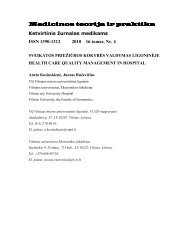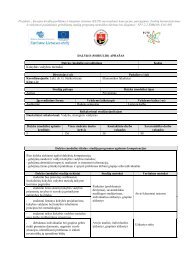Course unit description Course unit title Course unit code ...
Course unit description Course unit title Course unit code ...
Course unit description Course unit title Course unit code ...
Create successful ePaper yourself
Turn your PDF publications into a flip-book with our unique Google optimized e-Paper software.
<strong>Course</strong> <strong>unit</strong> <strong>description</strong><br />
<strong>Course</strong> <strong>unit</strong> <strong>title</strong><br />
Leadership<br />
<strong>Course</strong> <strong>unit</strong> <strong>code</strong><br />
Lecturer(s)<br />
Coordinator: Lect. dr. Žygimantas Grakauskas<br />
Department where the course <strong>unit</strong> is delivered<br />
Faculty of Economics<br />
Cycle Level of course <strong>unit</strong> Type of the course <strong>unit</strong><br />
Second<br />
Elective<br />
Mode of delivery<br />
Semester or period when the course Language of instruction<br />
<strong>unit</strong> is delivered<br />
Contact 3rd Semester Lithuanian<br />
Prerequisites<br />
Number of ECTS credits Student’s workload Contact hours Individual work<br />
allocated<br />
5 136 38 98<br />
Purpose of the course <strong>unit</strong>: programme competences to be developed<br />
The goal of the subject: To familiarise students with leadership phenomenon, theoretical models that explain it, also<br />
with peculiarities of leaders’ selection, assessment and development.<br />
Learning outcomes of the course <strong>unit</strong> Teaching and learning methods Assessment methods<br />
Students will know how leadership and<br />
management differ<br />
Students will know the major theories of<br />
leadership<br />
Students will be able to describe characteristics of<br />
a leader and explain his/her behaviour<br />
Students will know strong sides and<br />
characteristics for improvement of their own, as<br />
current and potential leaders<br />
Students will be able to organise processes of<br />
leaders’ selection, assessment and development<br />
Lectures, simulation of situations,<br />
role plays, group case analysis and<br />
discussions thematic discussions,<br />
individual study of material, project<br />
method<br />
Written exam, project, test,<br />
practical assignment,<br />
presentation<br />
<strong>Course</strong> content: breakdown of the topics<br />
Lectures<br />
Tutorials<br />
Individual work: time and assignments<br />
Seminars<br />
Laboratory work<br />
Internship/work placement<br />
Contact hours<br />
Individual work<br />
Assignments<br />
1. Concept of leadership.<br />
2. Leadership and management<br />
3. Theories explaining leadership phenomenon<br />
4. Transformational leadership<br />
2<br />
1<br />
3<br />
2<br />
1<br />
1<br />
2<br />
1<br />
3<br />
2<br />
5<br />
3<br />
3<br />
2<br />
18<br />
6<br />
Independent analysis of<br />
scientific and methodical<br />
literature on the issues of<br />
leadership.<br />
5. Analysis of leader personality: charisma, values,<br />
motives, personal characteristics, competencies<br />
2 1 3 6<br />
6. Formation of personal and organisation’s vision 2 1 3 6<br />
7. Skills of effective presentation 1 0 1 6<br />
8. Emotional intellect and leadership 2 1 3 8<br />
Preparation and<br />
presentation of project on<br />
leader selection,<br />
development and
9. Coaching, mentoring and leadership 1 1 2 3 assessment in selected<br />
10. Change initiation and management 2 1 3 6 organisation<br />
11. Conflict management 1 0 1 8<br />
12. Creativity and leadership 1 0 1 4<br />
13. Peculiarities, methods and procedures of leader<br />
selection and assessment.<br />
1 1 2 8<br />
14. Development of leadership 2 1 3 12<br />
15. Leader and society: dimension of social<br />
responsibility.<br />
1 0 1 2<br />
Total 32 32 64 72<br />
Assessment strategy Weight % Deadline Assessment criteria<br />
Exam 70 In the end of the<br />
course<br />
Correctness of information, depth and grounding of<br />
the answers<br />
Project assessment 30 During the<br />
course<br />
Creativity, internal consistency, realistic approach,<br />
ability to apply knowledge in practice, conformity of<br />
proposals with the organisation’s needs<br />
Author<br />
Publis<br />
hing<br />
year<br />
Title<br />
Required reading<br />
Bennis W., Nanus B. 1998 Lyderiai: Atsakomybės<br />
Issue No or<br />
volume<br />
Publishing house<br />
or Internet site<br />
Vilnius: Algarvė<br />
strategija.<br />
Boyatzis R., McKee A. 2006 Darni lyderystė. Vilnius: Verslo Žinios<br />
Kouzes J.M., Posner B.Z. 2003 Iššūkis vadybai. Kaunas: Smaltijos leidykla<br />
Masiulis K., Sudnickas T. 2007 Elitas ir lyderystė. Vilnius: MRU<br />
Northouse P.G. 2009 Lyderystė: teorija ir praktika Kaunas: Poligrafija ir<br />
Informatika<br />
Optional reading<br />
Bennis W., Goldsmith J. 2003 Learning to Lead. New York: Basic Books<br />
Bratton J., Grint K., Nelson<br />
D.L.,<br />
Puccio G.J., Murdock<br />
M.C., Mance M.<br />
2005 Organizational Leadership. Mason: Thomson South-<br />
Western<br />
2007 Creative Leadership: Skills<br />
Thousand Oaks: Sage<br />
that drive Change.<br />
Publications LTD.


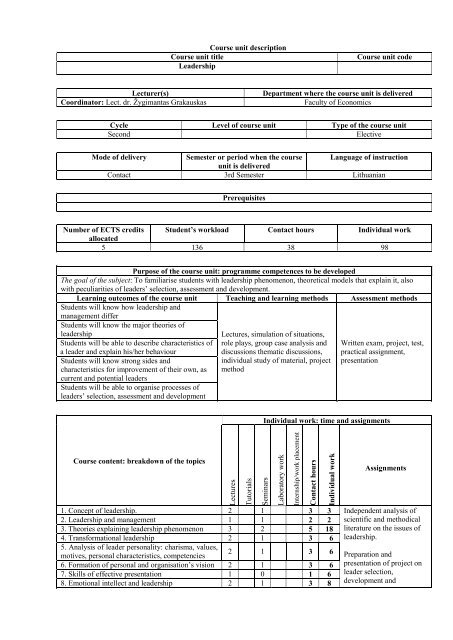
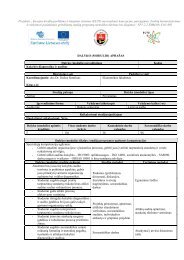
![[CV] Roma AdomaitienÄ - Vilniaus universitetas](https://img.yumpu.com/47453221/1/184x260/cv-roma-adomaitiena-vilniaus-universitetas.jpg?quality=85)
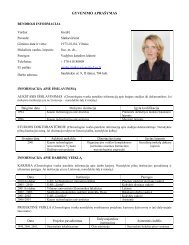
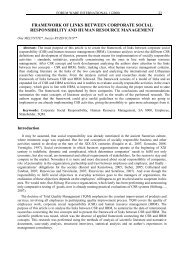
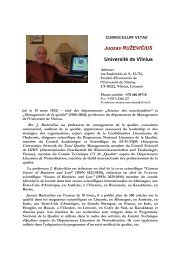


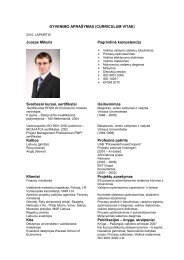
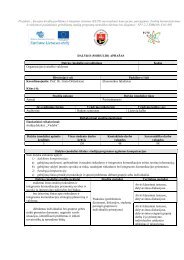
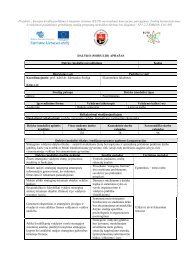
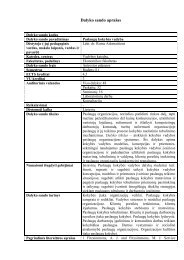
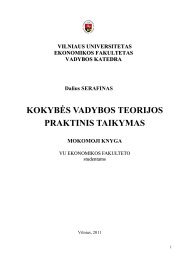
![[CV] Darius Klimas - Vilniaus universitetas](https://img.yumpu.com/32971109/1/184x260/cv-darius-klimas-vilniaus-universitetas.jpg?quality=85)
